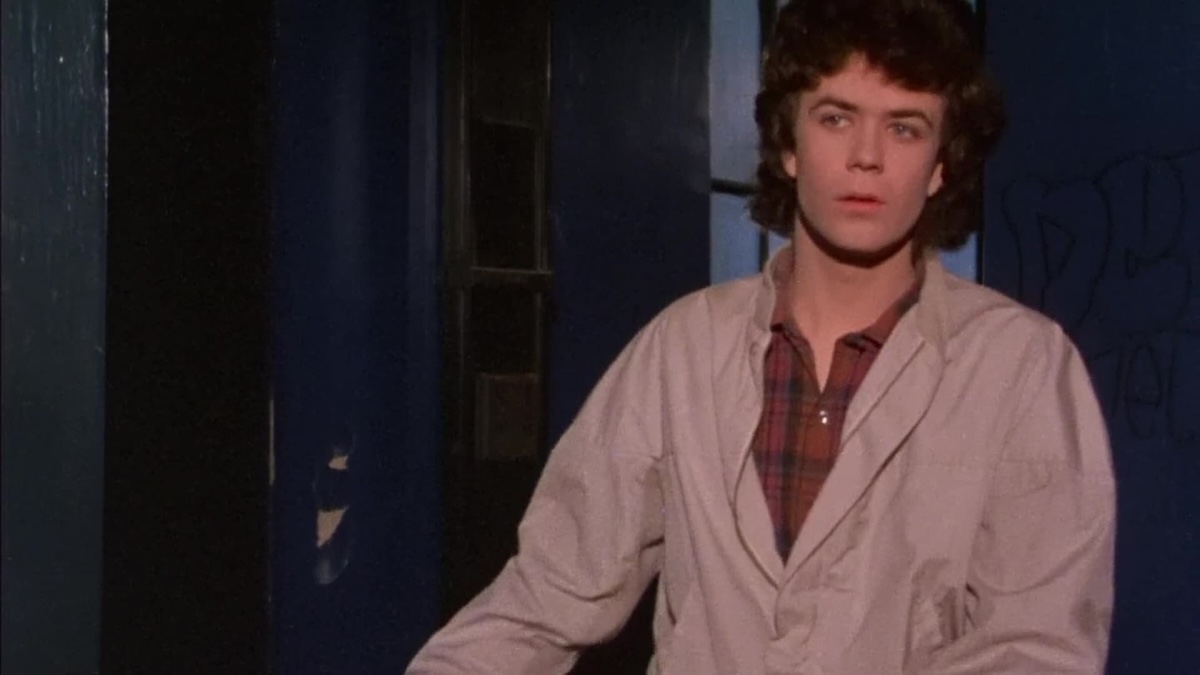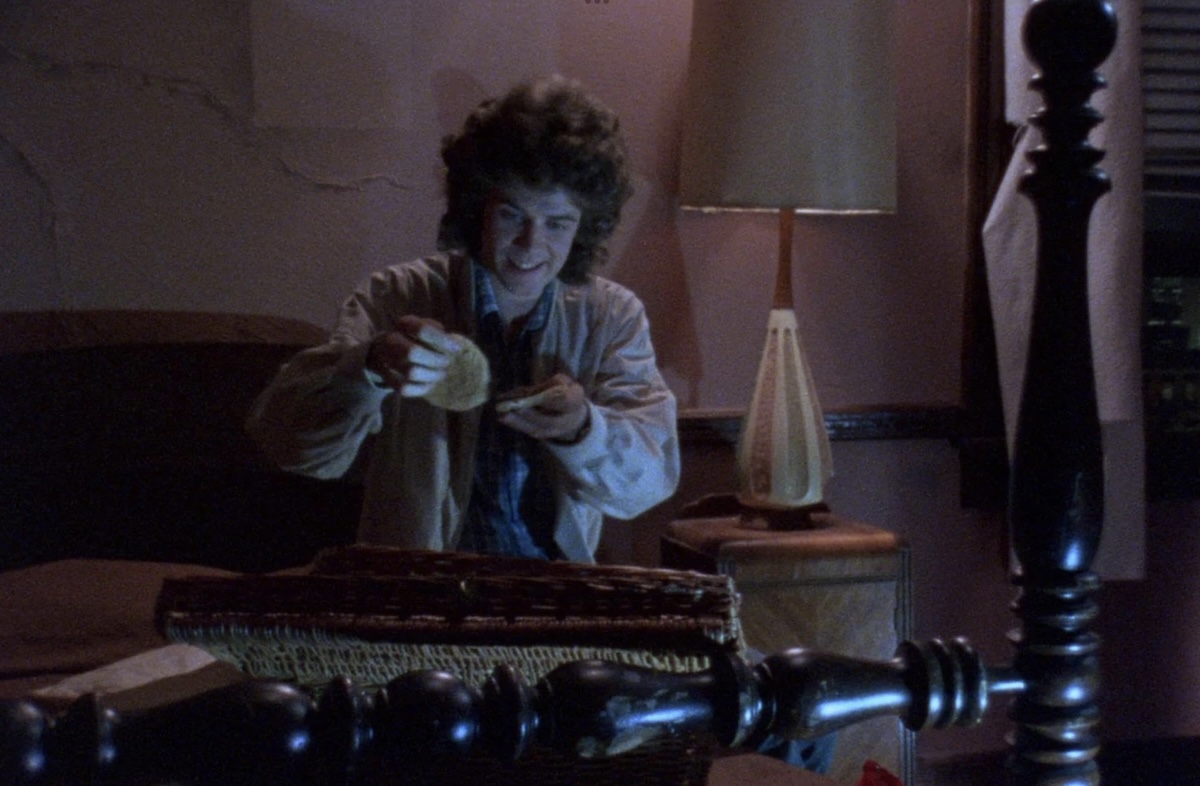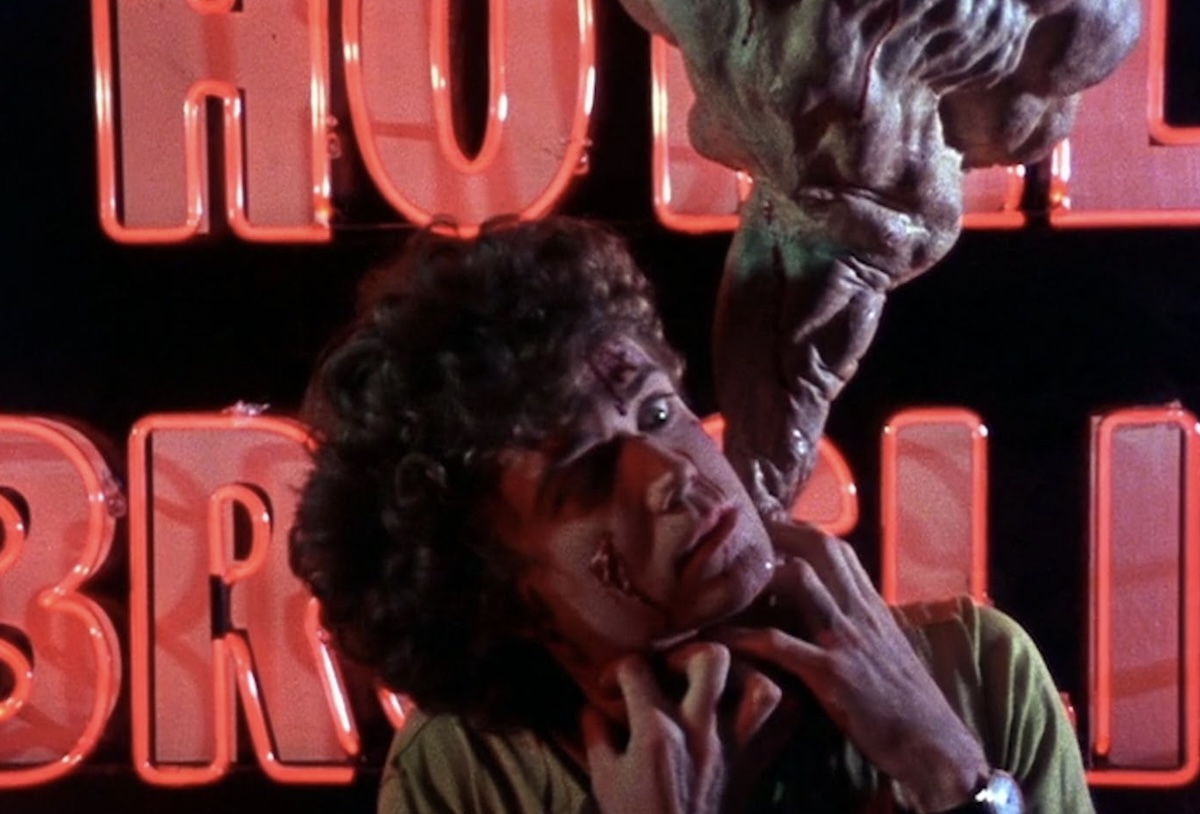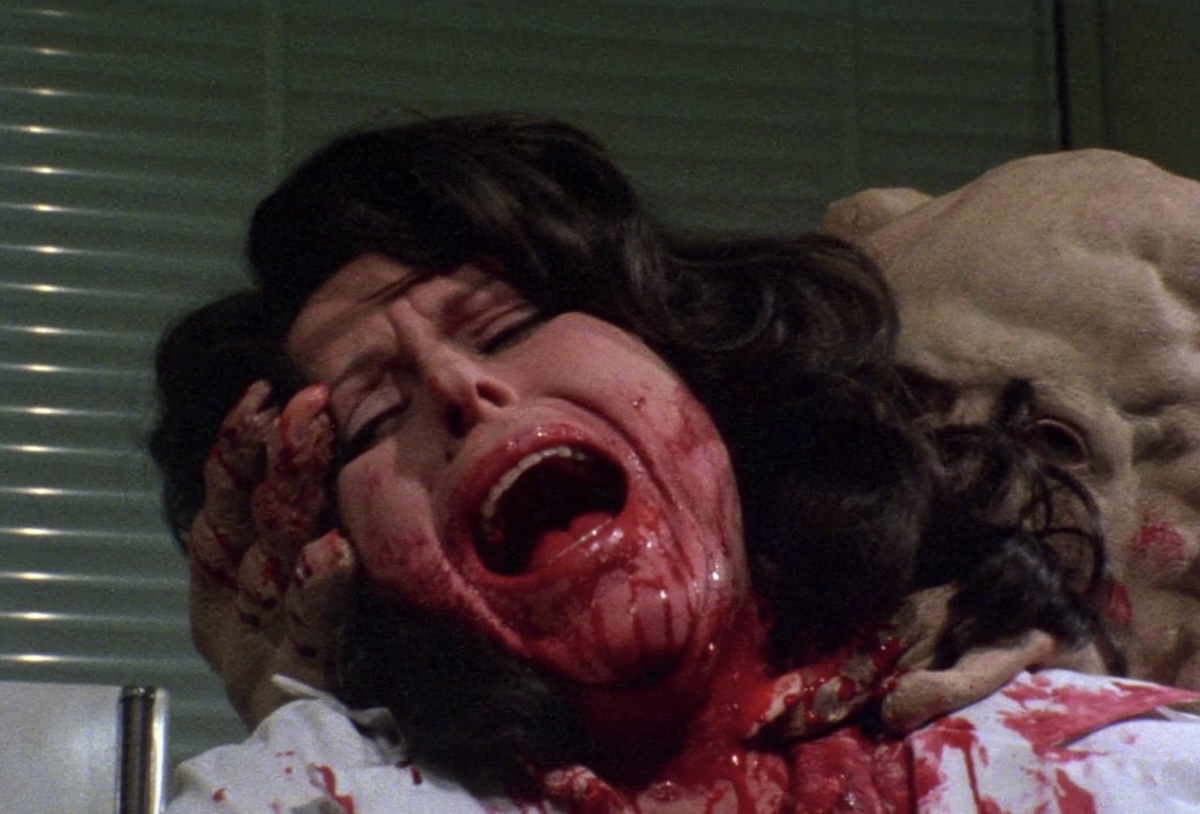BASKET CASE (1982)
A young man carrying a big basket that contains his extremely deformed, formerly conjoined twin brother seeks vengeance on the doctors who separated them against their will.

A young man carrying a big basket that contains his extremely deformed, formerly conjoined twin brother seeks vengeance on the doctors who separated them against their will.


The 1980s were a transitional period for American horror. A large number of maverick filmmakers took advantage of their independent sensibilities to create wildly imaginative exploitation fare. While Tobe Hooper’s (The Texas Chain Saw Massacre) and Wes Craven’s (The Hills Have Eyes) earliest work was just short of mainstream acceptance, audiences were beginning to recognise David Cronenberg (Videodrome) and Don Coscarelli (Phantasm). Amongst this small group of genre groundbreakers was writer-director Frank Henenlotter. Crafted from a rare combination of scarce resources and unwavering dedication, Basket Case is a grotesque comedy that could be considered one of the final pieces of exploitation cinema before home entertainment dominated the market.
Duane Bradley (Kevin VanHentenryck) is a pleasant guy who’s just arrived on the sordid streets of New York City. With a handful of cash and a large wicker basket under his arm, he checks into the dilapidated Hotel Broslin. Secreted away in his oversized Longaberger is Duane’s separated conjoined twin, Belial. Motivated primarily by the intense rage brought on by a life of being treated like a monster simply for existing, it’s eventually revealed the siblings have embarked on a journey of revenge against the team of veterinarians who illegally performed their separation surgery. Duane is committed to helping his brother complete their task, but complications occur when he meets the receptionist, Sharon (Terri Susan Smith). As he attempts to find human connection away from his murderous brother, Belial’s homicidal tendencies reach bloody new extremes.

Fluctuating between stilted passiveness and frantic overacting, the cast struggles to conceal their lack of professionalism. Despite its evident flaws, Basket Case benefits from a strong lead performance by Kevin Van Hentenryck. As Duane Bradley, the young actor brings a sense of vulnerability and desperation to the role, effectively conveying his character’s complex emotions. He has genuine affection for his conjoined twin, but his growing frustration at sacrificing his chance at normality is noticeable in almost every line of dialogue. It’s a sympathetic portrayal that helps to ground the narrative’s outlandish elements with a semblance of emotional realism. Van Hentenryck dedicated himself fully to the character and eventually reprised the role for Basket Case 2 (1990) and Basket Case 3: The Progeny (1991). Additionally, Beverly Bonner (Frankenhooker) is an entertaining presence as the Hotel Broslin’s resident prostitute, Casey. The actress imbues the story with some much-needed maternal warmth.
Before setting the vulgar precedent for his entire career with Brain Damage (1988) and Frankenhooker (1990), Frank Henenlotter unleashed an unapologetic slice of gruesome fun. Inspired by his misspent youth absorbing the exploitation horrors offered in New York City’s grindhouse theatres, Basket Case remains a visibly cheap and amateurish production. It’s the very definition of guerrilla filmmaking, held together with Henenlotter’s enthusiastic direction and the assistance of his talented friends. However, unlike the egregiously offensive work of his mentor, Herschel Gordon Lewis (She-Devil On Wheels), its eccentric charm transcends the shoestring budget of $35,000.

Basket Case contains all the ramshackle appeal of exploitation horror but separates itself by gleefully embracing the outlandish premise. An early scene feels intentionally comical and quickly establishes the tone for audiences. After arriving at The Hotel Broslin, Duane unloads a large bag of hamburgers into his wicker basket. As it shakes uncontrollably to the sound of Belial’s loud slurps, Duane assures his brother that they’ll soon exact their revenge on the questionable doctors who failed them. Henenlotter has a firm grasp of the material, and maintaining both horror and comedy is one of his major accomplishments. His uncanny sense of poetic timing strikes a perfect balance between absurd fantasy and misanthropic dark comedy, ensuring everything is played entirely for laughs.
The curiosity wreaking havoc at the heart of Henenlotter’s vision is Belial. Designed by John Caglione Jr. (Friday The 13th Part 2) and Kevin Haney (The Addams Family), this small monstrosity is an aggressive, twisted force of nature. Crudely brought to life through a combination of different practical effects, including puppetry, prosthetics, and stop-motion animation, Belial violently dispatches a myriad of characters by slashing their faces with his ungainly hands. There are several sequences infused with nightmarish tension that will simultaneously generate laughter and nervous exasperation among viewers. A particularly macabre moment involving a villainous veterinarian being impaled with several scalpels is a spectacular collision of technical achievement and camp horror. Admittedly, the twisted lump of deformed flesh is undeniably primitive when compared to the groundbreaking practical effects showcased in John Carpenter’s The Thing (1982). However, Belial’s creature design has become nothing short of iconic and continues to stand alongside the most memorable monsters in the history of exploitation cinema.

The original screenplay was far more ambitious but had to be trimmed down due to budgetary restrictions. Nevertheless, Henenlotter uses this neglected milieu to emphasise the atmosphere. Similar to its more well-respected contemporaries like Taxi Driver (1976), Basket Case perfectly captures the tempestuous energy of New York City in the early-1980s. A time when the rundown neon metropolis was still dangerous and home to countless indescribable characters.
The scene opens with Duane wandering down 42nd Street carrying his conspicuously padlocked wicker basket. He’s approached by an opportunistic drug dealer. “I got joints and bags, nickel and dime bags, gold Colombian smoke,” he begins, pitching every narcotic imaginable. Duane never breaks stride or acknowledges the persistent salesman. It’s a hilariously understated moment that paints an unsettling but incredibly accurate depiction of the city at that time. The dilapidated buildings and eccentric characters serve as a perfect backdrop for the unseemly adventures of Duane and Belial.

Henenlotter invites audiences into the sordid underbelly of Manhattan in a cinéma vérité style reminiscent of Abel Ferrara (King of New York). As we follow Duane down the seediest alleyways and into the deteriorating movie theatres, viewers can practically smell the stale hot dogs in the garbage.
To dismiss Basket Case as generic exploitation trash would be a disservice to Henenlotter’s genuine compassion for his broken characters. Underpinning the grotesque violence is a poignant meditation on the importance of human connection and the crippling effects of rejection. Despite his outward appearance and seemingly monstrous nature, Belial elicits an unexpected emotional resonance in the proceedings. A protracted flashback sequence eventually reveals that the two brothers were once conjoined twins. Due to Belial’s physical deformity, their father (Richard Pierce) hired three unscrupulous veterinarians to perform an illegal operation to surgically separate them. Having survived the torturous procedure and being surreptitiously abandoned in an alleyway, Duane eventually rescued his brother and the pair vowed to remain together.

Henelotter continues to build layers of complexity to the brothers’ dynamic when Duane begins a relationship with Sharon. Belial’s mounting fear of abandonment and neglect only encourages the monstrosity to become more destructive and violent. Ultimately, the situation naturally escalates and culminates in an operatic confrontation. The patently ludicrous narrative could almost be considered a demented variation on Brian De Palma’s Sisters (1972) and David Lynch’s Eraserhead (1977). However, it’s beautifully surreal how Henelotter successfully transforms his monstrous creation into a sympathetic character. Basket Case invites audiences to contemplate their capacity for empathy towards those who are marginalised or misunderstood. It provides a poignant reminder of the importance of compassion and acceptance in a world that often struggles with acknowledging and embracing diversity.
Basket Case proved so offbeat and intelligent that it managed to garner some attention from mainstream critics upon its release. Hailed by critic Joe Bob Briggs as one of the best horror films ever made, it developed a healthy cult following after its release on home video. Frank Henenlotter’s debut has become a cult classic, rightly so, thanks to its unique sensibilities and fantastic grindhouse production values. Though irredeemable in the traditional sense, it’s impossible not to be charmed by Henenlotter’s rare blend of intuition and resourcefulness.
Basket Case will be available on Arrow from 30 April 2024.
USA | 1982 | 91 MINUTES | 1.33:1 | COLOUR | ENGLISH

Showcasing a wonderful 2160p Ultra HD transfer, Arrow Video’s revelatory transfer was sourced directly from Frank Henenlotter’s original 16mm camera negatives and approved by The Museum of Modern Art (MoMA). Presented in its native 1.33:1 aspect ratio, the beautifully rich image honours Basket Case’s unpleasant beauty. The natural grain structure remains intact and is beautifully rendered to heighten the grindhouse aesthetic. Despite the healthy amount of grain, there are no noticeable noise fluctuations or stability issues to report. Individual textures remain sharp and flesh tones appear natural, revealing the finest blemishes across Belial’s prosthetics.
Arrow has managed to revive the print by injecting almost every frame with vibrant colour. Dolby Vision effectively intensifies the palette and accurately reproduces the primary colours. The overwhelming amount of neon lights throughout the debauched Times Square and the hallucinatory lighting remain saturated and rich. Notably, crimson reds have received a noticeably healthy boost, more so than ever before. Basket Case undoubtedly benefits from a remarkably clean and bright transfer, surpassing Second Sight Films’ 2012 Blu-ray release.
Unfortunately, this release only features a single standard audio track with optional subtitles. It’s immediately obvious Arrow Video has restored the English LPCM 1.0 track. Gus Russo’s (Brain Damage) electronic score is delightfully cheesy and surges through the speakers with clarity. The side and rear channels add significant weight to the supporting sound effects, creating an immersive atmosphere. Sonic accents like Belial’s startling screams and shattering glass are distinct, while distant sounds like police sirens and heavy footfall are handled well. Dialogue remains primarily at the front and is generally clear and discernible. Overall, this is a solid transfer, perhaps the best Basket Case has ever sounded.

writer & director: Frank Henenlotter.
starring: Kevin VanHentenryck, Terri Susan Smith, Beverly Bonner, Robert Vogel, Lloyd Pace, Bill Freeman, Diana Browne, Joe Clarke, Ruth Neuman & Richard Pierce.
